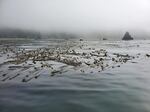Since a marine heatwave that happened from 2013 to 2015, there have been important ecosystem changes on the Oregon Coast. The populations of bull kelp, sunflower sea stars and other important marine species like abalone have been on the decline. At the same time, the population of purple sea urchins is rising rapidly.
The Oregon Department of Fish and Wildlife Marine Resources Program was recently awarded a $250,000 grant to study those ecological changes.

A rare healthy bull kelp bed floats near Port Orford Heads State Park in Port Orford, Ore.
Kate Kaye / JPR News
Steve Rumrill is the Shellfish Program Leader at ODFW. He says very little is known about what caused these population changes.
“It makes sense to think that there’s trophic or food web relationships directly controlling all of this but we don’t have field experiments or laboratory experiments to directly show the cause-effect relationship,” he said.
The grant money will fund scuba divers and remotely operated vehicles to survey the changes in the coastal environment. It will also fund equipment to monitor ocean temperatures and oxygen levels.
Researchers are already running some field tests to see why the bull kelp in the area is not growing.
“One of the thoughts is that the grazing by the purple sea urchins has not allowed the kelp to come back, even when temperatures are okay,” said Rumrill. “So we are working with volunteer divers and so far the divers have removed over 40,000 sea urchins from a particular cove down in Port Orford.”
Rumrill says researchers are considering experiments to study the decline of bull kelp habitat. Some of these include artificially enhancing kelp spores, placing sunflower sea stars to help control the purple sea urchins or even reintroducing sea otters to eat the urchins.